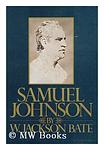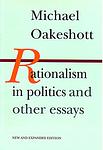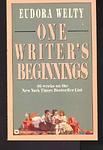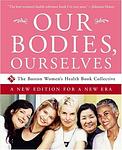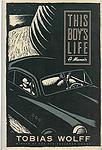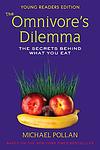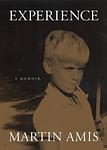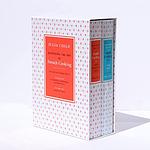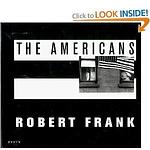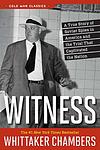The Greatest "Nonfiction" Books Since 1950
Click to learn how this list is calculated.
This list represents a comprehensive and trusted collection of the greatest books. Developed through a specialized algorithm, it brings together 300 'best of' book lists to form a definitive guide to the world's most acclaimed books. For those interested in how these books are chosen, additional details can be found on the rankings page.
Genres
Countries
Date Range
Reading Statistics
Click the button below to see how many of these books you've read!
Download
If you're interested in downloading this list as a CSV file for use in a spreadsheet application, you can easily do so by clicking the button below. Please note that to ensure a manageable file size and faster download, the CSV will include details for only the first 500 books.
Download-
126. Samuel Johnson by Walter Jackson Bate
This biography provides an in-depth look into the life of Samuel Johnson, an 18th-century English writer who contributed greatly to English literature as a poet, essayist, moralist, literary critic, biographer, and lexicographer. The book explores Johnson's struggles with depression, fear of death, and various physical ailments, as well as his intellectual prowess and his impact on literature. It also delves into his relationships with other notable figures of his time, offering a comprehensive portrait of a complex and influential man.
-
127. Rationalism in Politics by Michael Oakeshott
"Rationalism in Politics" is a collection of essays that critique the role of rationalism in politics, arguing that political decisions should be based on tradition and experience rather than abstract theories. The author asserts that rationalism, with its emphasis on premeditated, systematic approaches, often fails to acknowledge the complexity and unpredictability of human behavior and social dynamics. He emphasizes the importance of practical knowledge, acquired through experience, in political decision-making and criticizes the rationalist's disregard for such wisdom.
-
128. One Writer's Beginnings by Eudora Welty
This memoir explores the author's early life in Mississippi and her journey towards becoming a writer. The narrative is divided into three sections: Listening, Learning to See, and Finding a Voice, which respectively discuss the author's childhood memories, her education and love for reading, and her growth as a writer. The book delves into the author's personal experiences, her family history, and the influence of the Southern United States on her work.
-
129. Collected Works of Edna St. Vincent Millay by Edna St. Vincent Millay
This collection encompasses the prolific works of a renowned Pulitzer Prize-winning poet. The book includes her famous sonnets, lyrical poems, and plays, all of which are marked by their romanticism, feminism, and social and political commentary. Her profound exploration of human emotions and experiences, particularly love and loss, along with her distinctive poetic style, has left an indelible mark on American literature.
-
130. The Warmth Of Other Suns by Isabel Wilkerson
"The Warmth of Other Suns" is a powerful and deeply moving narrative that chronicles the Great Migration, a significant event in American history that saw millions of African Americans leave the South in search of better opportunities and freedom from racial oppression. Through the compelling stories of three individuals, the book explores the challenges, triumphs, and sacrifices made by these courageous migrants as they embarked on a journey to find a new life in the North and West, ultimately reshaping the social and cultural landscape of America.
-
131. Our Bodies, Ourselves by Unknown
This book is a comprehensive guide to women's health and sexuality, covering a wide range of topics from puberty to menopause. It emphasizes the importance of self-care and provides practical information on topics such as reproductive health, sexual orientation, body image, mental health, and domestic violence. The book is designed to empower women to make informed decisions about their health and well-being, and it encourages them to take control of their own bodies. It also includes personal stories and experiences from diverse women, reflecting a wide range of perspectives and experiences.
-
132. The Armies of the Night by Norman Mailer
This book is a unique blend of historical fact and autobiographical fiction, providing a detailed account of the October 1967 March on the Pentagon. It describes the author's experiences during the anti-Vietnam War demonstrations, where he was arrested and spent the night in jail. The narrative explores the author's interactions with other protesters, his observations on the nature of political activism, and his personal reflections on the Vietnam War. It also delves into the author's struggles with his personal beliefs and his role as a public figure during this turbulent period in American history.
-
133. Alan Turing by Andrew Hodges
This biography provides a comprehensive look at the life and work of a pioneering computer scientist and mathematician who played a crucial role in breaking the Enigma code during World War II. It delves into his groundbreaking contributions to the development of computer science, his tragic prosecution for homosexuality, and his enduring legacy in the field of artificial intelligence and computing. The book not only celebrates his scientific achievements but also examines the social context of his time, shedding light on the challenges he faced and the impact of his work on future generations.
-
134. The Devil In The White City by Erik Larson
This book intertwines the true tales of two men during the 1893 Chicago World's Fair: Daniel H. Burnham, the architect responsible for the fair's construction, and H.H. Holmes, a serial killer masquerading as a charming doctor. The narrative alternates between the story of Burnham, his challenges and successes in building the fair, and the chilling story of Holmes, who used the fair to lure his victims to their death. It's a vivid portrayal of the Gilded Age and a chilling exploration of one of America's first known serial killers.
-
135. Modern Times by Paul Johnson
"Modern Times" is an in-depth historical analysis of the 20th century, covering major events, movements, and figures that have shaped the modern world. The author critically examines the impacts of World War I and II, the Cold War, the rise of totalitarian regimes, and the influence of religion and ideology on politics and society. The book also explores significant scientific and technological advancements, and their effects on human perception and behavior. It provides a comprehensive understanding of the complexities and contradictions of the 20th century, and how they continue to influence the 21st century.
-
136. This Boy's Life by Tobias Wolff
This memoir explores the author's challenging childhood as he moves across the country with his divorced mother, fleeing an abusive relationship and seeking a better life. The young boy struggles with his identity, often resorting to lies and deceit to create a more favorable image of himself. As he navigates adolescence in a small town in the 1950s, he contends with a violent stepfather, school troubles, and his own rebellious nature. Despite the adversity, he maintains a sense of hope and resilience, offering a compelling portrait of a young man coming of age in post-war America.
-
137. The Captive Mind by Czesław Miłosz
"The Captive Mind" is a thought-provoking exploration of the intellectual and moral dilemmas faced by artists and intellectuals living under oppressive regimes. Through a series of powerful and insightful essays, the author delves into the psychological and ideological transformations experienced by individuals who compromise their values and conform to the demands of totalitarianism. With a blend of personal anecdotes, historical analysis, and philosophical reflections, this book offers a profound examination of the complexities of intellectual freedom and the power of ideology.
-
138. The Omnivore's Dilemma by Michael Pollan
The book delves into the question of what we should have for dinner. It explores the paradox of the omnivore's dilemma, detailing the food chains that link farm to table, and explaining how the industrial revolution has changed the way we eat. The book also discusses the implications of our modern diet on our health and the environment, suggesting that we should return to more traditional methods of food production and consumption. It advocates for a more conscious and sustainable approach to eating.
-
139. Experience by Martin Amis
"Experience" is a memoir which delves into the author's life, exploring his relationships with his family, friends, and his own self. The narrative is a candid reflection on his father's influence, his friendships with other writers, his marriages, and his children. The author also discusses his experiences with fame, age, and loss, providing an intimate look into his personal and professional journey. The memoir is a blend of the author's unique humor, sharp observations, and poignant moments, offering a compelling and deeply personal narrative.
-
140. Patriotic Gore by Edmund Wilson
"Patriotic Gore" is a comprehensive study of American literature during and after the Civil War. The author examines the works of writers such as Abraham Lincoln, Harriet Beecher Stowe, and Oliver Wendell Holmes, among others, to present a nuanced understanding of how the war influenced American literature and culture. The book offers a unique perspective on the Civil War, focusing on the intellectual and cultural responses to the conflict rather than the military and political aspects.
-
141. Schindler's Ark by Thomas Keneally
The book is a historical novel based on the true story of a German industrialist who becomes an unlikely humanitarian amid the barbaric Nazi reign. When he witnesses the horrors inflicted upon the Jews, he is moved to save as many as he can by employing them in his factory. His actions, driven by courage and compassion, lead to the salvation of over a thousand Jewish workers from certain death in the Holocaust. The narrative explores themes of morality, survival, and the capacity for good in the face of overwhelming evil, as the protagonist navigates the complexities of war and the human spirit.
-
142. Mastering the Art of French Cooking by Julia Child, Simone Beck, Louisette Bertholle
This book is a comprehensive guide to traditional French cuisine, providing detailed instructions on how to prepare classic French dishes. It covers everything from basic techniques to complex recipes, all explained in a clear and accessible way. The book also includes tips on selecting ingredients, planning meals, and pairing wines, making it an essential resource for anyone interested in French cooking.
-
143. The Rise and Fall of the Third Reich by William L. Shirer
This book provides a comprehensive history of Adolf Hitler's Third Reich, from its inception to its downfall during World War II. The author, an American journalist who reported from Germany and Austria during the Nazi era, uses firsthand accounts, interviews, and Nazi documents to detail Hitler's rise to power, the mechanisms of the Nazi state, and the events leading to and during World War II, including the Holocaust. The book concludes with an analysis of why the Third Reich fell and the aftermath of its collapse.
-
144. The Last Lion by William Manchester
"The Last Lion" is a comprehensive biography of Winston Churchill, providing an in-depth look at his life, from his birth in 1874 to his death in 1965. The book covers Churchill's early years, his military service, his time as a journalist, and his political career, including his role as British Prime Minister during World War II. It also delves into his personal life, relationships, and struggles with depression. The book presents a nuanced portrayal of Churchill, highlighting his strengths, flaws, victories, and defeats.
-
145. The Liars' Club by Mary Karr
The memoir is a gritty, often hilarious look at a childhood in a dysfunctional family in a small Texas town. The narrative follows the author's experiences growing up in the 1960s in a family rife with alcoholism, mental illness, and violence. It is a story of resilience and survival, as the author navigates her chaotic home life, the sexual abuse she suffered, and her mother's mental instability, eventually finding solace in literature and writing. Despite the harsh realities it depicts, the book is filled with humor and love, offering a poignant exploration of the bonds of family and the power of storytelling.
-
146. Dreams from My Father by Barack Obama
This memoir explores the life of a man who grew up in a multicultural family, with a Kenyan father and an American mother. The narrative delves into his early years in Hawaii and Indonesia, his self-discovery and racial awakening in Chicago, and his journey to Kenya to learn more about his father's heritage. The book provides an introspective look at the author's struggle with his racial identity, his relationship with his family, and his path to finding his place in the world.
-
147. Truman by David McCullough
This biography offers an in-depth examination of the life and presidency of Harry S. Truman, the 33rd President of the United States. The book covers his humble beginnings in Missouri, his service in World War I, his political ascension, and his unexpected presidency following the death of Franklin D. Roosevelt. The narrative also delves into his controversial decisions such as the use of atomic bombs on Japan and his handling of the Cold War, providing a comprehensive and balanced view of Truman's leadership and legacy.
-
148. The Americans by Robert Frank
"The Americans" is a photographic journey through the United States in the 1950s, capturing the everyday lives of its citizens. The book presents a raw, unfiltered view of American society during this time, revealing both its strengths and weaknesses. It offers a unique perspective on the country's culture, racial tensions, economic disparities, and political climate, providing a profound commentary on the American experience.
-
149. Witness by Whittaker Chambers
"Witness" is a gripping autobiography that chronicles the author's life as a Communist party member, his espionage activities for the Soviet Union, and his eventual renunciation of communism. The book also details his role as the key witness in the 1948 Alger Hiss trial, a high-profile case that had a major impact on American politics during the Cold War. The narrative explores themes of ideology, betrayal, and redemption, and provides a unique perspective on the ideological battles of the 20th century.
-
150. The Sixth Extinction: An Unnatural History by Elizabeth Kolbert
The book explores the concept of the sixth extinction, suggesting that we are currently in the midst of it due to human activity. By examining previous mass extinctions and the current rapid loss of species, the author argues that humans are causing a mass extinction event through climate change, habitat destruction, and spreading of non-native species. The book offers a sobering look at the impact of human behavior on the natural world, emphasizing the urgency of addressing these environmental issues.
Reading Statistics
Click the button below to see how many of these books you've read!
Download
If you're interested in downloading this list as a CSV file for use in a spreadsheet application, you can easily do so by clicking the button below. Please note that to ensure a manageable file size and faster download, the CSV will include details for only the first 500 books.
Download